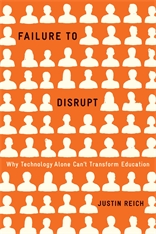Plus de 524 000 visiteuses et visiteurs par an!
Menu
Plus de 524 000 visiteuses et visiteurs par an!
Plus de 524 000 visiteuses et visiteurs par an!

Proponents of large-scale learning have boldly promised that technology can disrupt traditional approaches to schooling, radically accelerating learning and democratizing education. Much-publicized experiments, often underwritten by Silicon Valley entrepreneurs, have been launched at elite universities and in elementary schools in the poorest neighbourhoods. Such was the excitement that, in 2012, the New York Times declared the "year of the MOOC." Less than a decade later, that pronouncement seems premature. In Failure to Disrupt: Why Technology Alone Can't Transform Education, Justin Reich delivers a sobering report card on the latest supposedly transformative educational technologies. Reich takes readers on a tour of MOOCs, autograders, computerized "intelligent tutors," and other educational technologies whose problems and paradoxes have bedeviled educators. Learning technologies-even those that are free to access-often provide the greatest benefit to affluent students and do little to combat growing inequality in education. And institutions and investors often favor programs that scale up quickly, but at the expense of true innovation. It turns out that technology cannot by itself disrupt education or provide shortcuts past the hard road of institutional change. Technology does have a crucial role to play in the future of education, Reich concludes. We still need new teaching tools, and classroom experimentation should be encouraged. But successful reform efforts will focus on incremental improvements, not the next killer app.
Reich, J. (2020). Failure to disrupt - Why technology alone can't transform education. Boston: Harvard University Press.
Reconnaissance du territoire autochtone
Contact North | Contact Nord reconnaît et respecte que son travail, ainsi que celui de ses partenaires communautaires, se déroule sur les territoires traditionnels des peuples autochtones à travers l’Ontario.